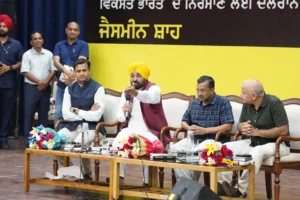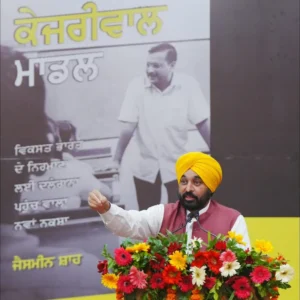Chandigarh/ Mohali, July 8 – The Punjabi edition of Kejriwal Model, a book by Aam Aadmi Party (AAP) leader Jasmine Shah, was officially released on Monday in Mohali during a high-profile event celebrating the party’s vision for governance rooted in public welfare and transparency.

AAP national convenor Arvind Kejriwal, Punjab Chief Minister Bhagwant Mann, and former Delhi Deputy CM Manish Sisodia were present at the launch, which marked what party leaders described as a “historic moment” for the politics of accountability and inclusive development.
“We didn’t enter politics to win elections,” said Kejriwal. “We came to build a governance model that ensures dignity, quality education, healthcare, and electricity for the common man. This model was born in the slums of Delhi—not in a boardroom.”
The book, published by Unistar Books, was unveiled in the presence of general secretary Deepak Bali and publishers Harish Jain and Rohit Jain. Shah, in her address, explained her motivation for writing the book: “I witnessed a governance model that changed Indian politics—where the focus shifted from power to people, from corruption to service.”

She contrasted the “Kejriwal model” with the “corporate-backed Modi model”, saying, “While our model is based on welfare, the Gujarat model reflects corporate interests. In Gujarat, ₹16 lakh crore in loans were waived off for corporates, while cuts were made to the education budget.”
Reinforcing the public service ethos of the AAP, Kejriwal declared, “This model runs only on honesty. If the Chief Minister or a minister is corrupt, the model cannot work. We proved this in Punjab—schools, hospitals, and electricity can improve if you stop corruption and save money.”
Mann echoed this sentiment, crediting Kejriwal for changing the language of politics. “We were trapped in the politics of crematoriums and sewerage. Kejriwal showed what governments can actually do. He removed caste and religion from the agenda and replaced them with development.”
Manish Sisodia, hailing Kejriwal as his mentor, said, “The Kejriwal model represents the politics and governance of the common man. It draws from the ideas of Gandhi, Lohia, and Bhagat Singh but delivers in practical terms.”
He cited employment data to highlight the urgency of such a model: “Between 2015 and 2022, over 23 crore people applied for government jobs, but only 7.22 lakh got employment. This is the context in which this book must be read.”
Kejriwal also took aim at the current state of Delhi under BJP-appointed administrators. “Ever since the Aam Aadmi Party was sidelined in Delhi, the city has regressed. Mohalla clinics are shutting down, medicines and tests are unavailable, power cuts are back, and citizens are again waiting six hours for basic services.”
Mocking his critics, Kejriwal added, “I should be nominated for a Nobel Prize in administration—for managing to work under constant interference from the LG.”
He also reiterated that AAP’s mission is not electoral dominance but governance reform. “We’re not interested in contesting elections everywhere. But we’re ready to help any government that genuinely wants to work. I’ll even send Sisodia to train them.”
Concluding his remarks, Kejriwal teased a sequel: “If this pace continues, Jasmine Shah will soon write a book on the ‘Punjab Model’.”
Mann, lauding Shah for launching the book in three languages at a young age, added, “Every book tells a story, and I hope to write mine someday. My politics didn’t work at first. It worked later.”
The Kejriwal Model book is being positioned by AAP as more than a political memoir—it is being framed as a manual for a new kind of governance, one that puts honesty, equity, and basic services at the forefront of statecraft.


